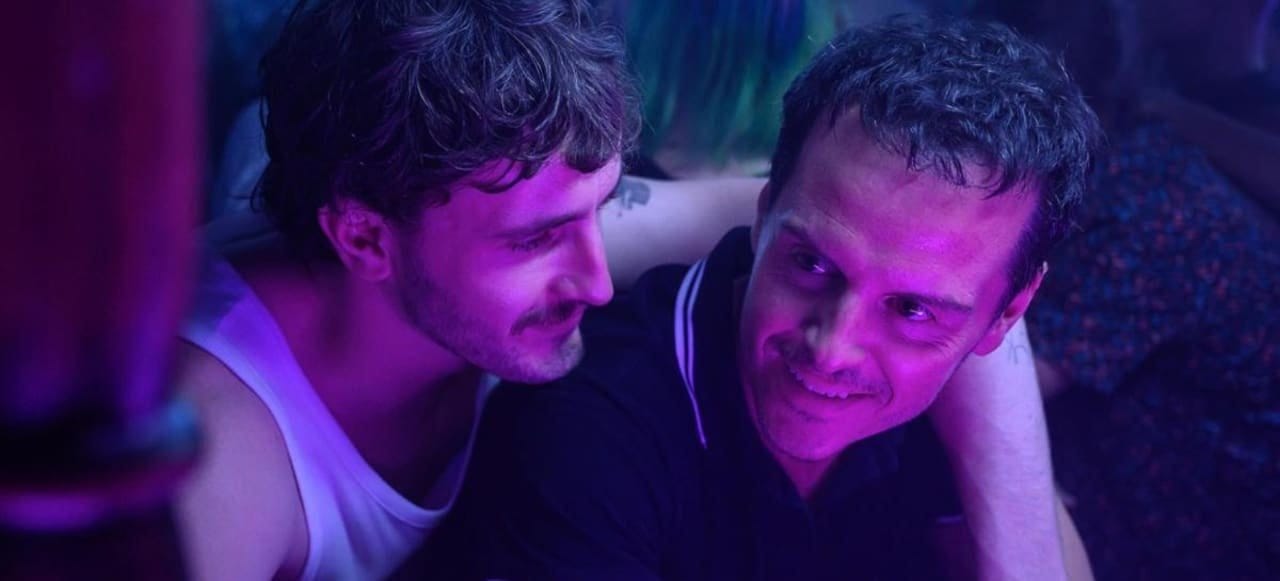All of Us Strangers review
Paul Mescal and Andrew Scott’s Ghostly love story will break your heart. Read our review written by the incredible Miriam Balanescu.
In All of Us Strangers, Andrew Haigh’s sixth feature film, the first thing we see is light: the hazy blue dawn, then the sunrise painting the tower blocks on London’s skyline a raw, fiery red. There’s a kind of otherworldly radiance that courses throughout this haunting romance, landing somewhere between modern-day ghost story and deftly rendered family drama – with a shy, gay writer Adam (Andrew Scott) at its heart.
Mostly locked away in his city flat and gazing listlessly at a blank Word doc on his laptop, or otherwise watching crackly Top of the Pops videos while snacking on gingernut biscuits, Adam has decided to start work on a new screenplay which revisits his childhood growing up in eighties Britain. Simultaneously, his sole, slightly chaotic neighbour Harry (Paul Mescal) in an eerily empty (and yet very tall) apartment building begins paying him late-night visits, having spied Adam through his window during a routine fire alarm drill.
Aside from the unsettling lack of other people in this metropolitan setting, so far, so normal. That is until Adam hops on an overground train back to the sprawling suburbia of his youth and there encounters his parents (Claire Foy and Jamie Bell) going about daily life as usual in their two-bed detached house, mysteriously unaged – roughly as old as Adam himself – and seemingly ready, if a little bit startled, to welcome him back home.
In terms of thematic territory and genre, All of Us Strangers draws the most parallels to Haigh’s 2011 Tom Cullen-starring romcom-adjacent drama, Weekend. But unlike the rest of his oeuvre, Haigh’s latest has a distinctive supernatural edge, owed in large part to his source material, Strangers by Taichi Yamada. Around the skeleton of the concept of Yamada’s novel, however, Haigh – both writer and director – has done the heavy lifting, fleshing out a reality in which the ripples made by the AIDS crisis are still felt in the lives of queer men. The present is threaded with the past in this stirring love story where what’s real and what’s not are left captivatingly unclear.
The echoes of eighties anthems, from the Pet Shop Boys to Frankie Goes to Hollywood – amidst a masterfully hypnotic score by Emilie Levienaise-Farrouch – are both comforting and unnerving in equal measure, hoisting this bygone decade back into the present, while other hints of the past (a car screech, a child that resembles the young Harry) are scattered cleverly throughout the narrative like a trail of breadcrumbs. And – the dialogue between Adam and Harry suggests – fundamentally things haven’t really changed that much for the queer community, despite Adam’s faltering protest to his mother that “things are different now”.
One concern that runs through Weekend and All of Us Strangers is the idea that coming out to one’s parents is a key, formative experience. The two protagonists of these films, for different reasons, have this moment stolen from them, leaving them unable in some way to settle into their sense of self. For Adam, queer loneliness – the isolation triggered by the fact that society posits straightness as the norm, necessarily leaving queer individuals on the margins – is compounded by the grief of losing his parents, doubling up on his fears of forever being alone.
Scott navigates this tricky emotional terrain with irrefutable skill, harnessing the many complexities of this young writer, from a cautious reservedness in his new romantic relationship with Harry to a childlike fragility found with his family. Meanwhile, Foy and Bell give staggering performances as his parents. Only Mescal feels ever so slightly out of place as Adam’s zany, troubled neighbour – with a northern accent unconvincing enough to rival Barry Keoghan’s Liverpool accent in Saltburn – often seen swinging a bottle in his hand. (He does at one point ditch alcohol, but that doesn’t last for long.) There is, though, plenty of chemistry between the two leads, and the sex scenes in which they both star feel refreshingly sincere and understated.
These juxtapositions – crimson and violet, past and present, emotional frostiness and warmth – seem to be at the core of All of Us Strangers, Adam see-sawing between these different poles as he struggles to hold onto his relationships. With its many-windowed apartment blocks and sunlight-brushed train windows, All of Us Strangers is a film swarming with reflections, both literal and symbolic – but in spite of this self-scrutiny, Haigh’s conclusion finds our sense of the present is as hazy as our sense of the past. Beneath its light, tenderness and warmth, this examination of queer loneliness is often chilling, disruptive and bravely unafraid of leaving its question marks un-erased.





